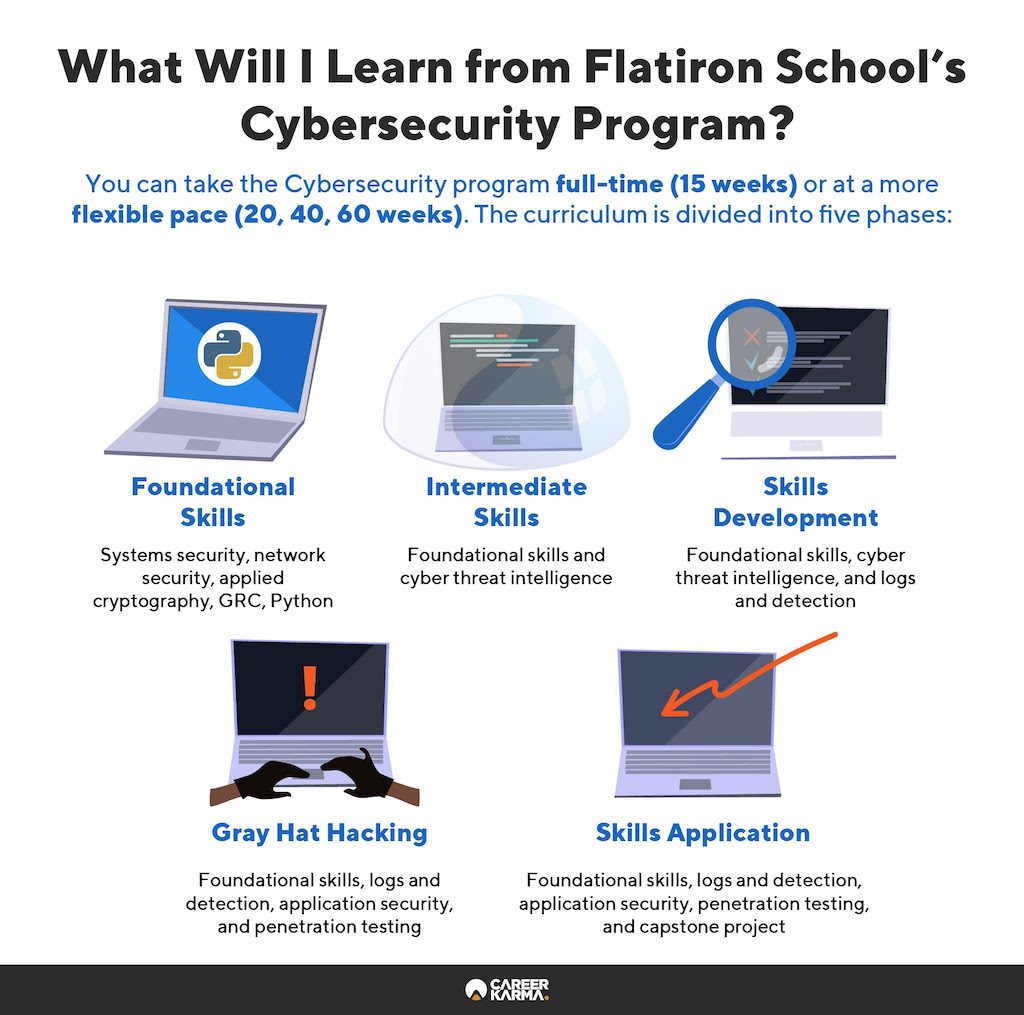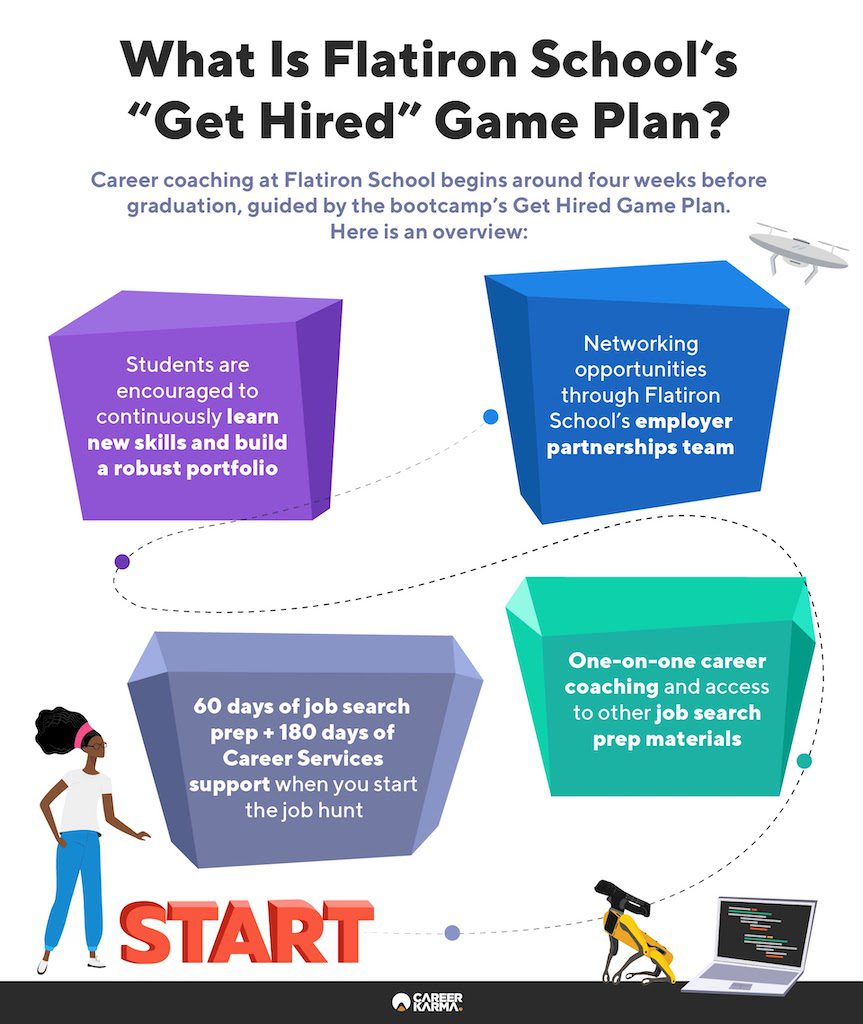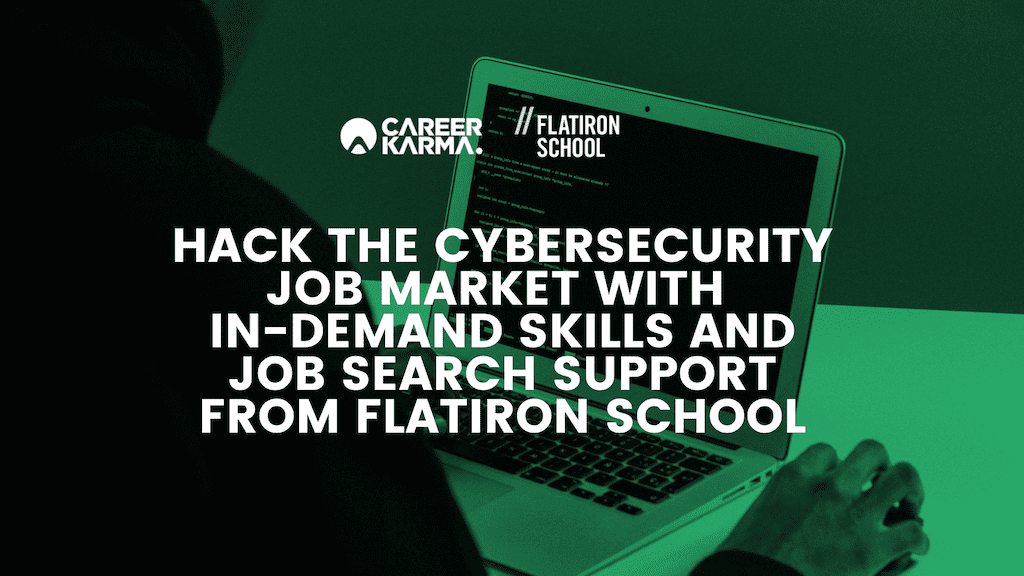Cybersecurity is bound to be the pressing issue of the decade, according to IBM India chairman Arvind Krishna, with hackers coming after today’s most important currency: data. Working to strengthen our cyber defenses are bootcamps like Flatiron School, which promise intensive and hands-on training for anyone looking to join the ranks of today’s cybersecurity professionals.
The question is: Can this training help you launch a new career?
Flatiron School combines rigorous cybersecurity training with comprehensive job search support to help you hack into the industry.
Enroll in Flatiron School today.How Cybersecurity Failure Became a Global Threat
The World Economic Forum earlier this year ranked the top three clear and present dangers in today’s society: infectious diseases, livelihood crises, and extreme weather events. Following on their heels is a fourth threat: cybersecurity failure.
For five years in a row, the challenge of cyber risks has ranked high in the list of global threats for its disruptive potential and increasing prevalence. According to cybersecurity firm Recorded Future, every hour last year witnessed more than seven ransomware attacks, totaling around 65,000 breaches. And that’s in the United States alone.
The cyberwar is in full swing. Partly to blame is the global pandemic. The rise in the number of companies and employees going fully digital has opened many channels for digital vulnerabilities and eventual data breaches. Employers are, therefore, facing pressure to finally put much of their focus on strengthening their security systems and capabilities by investing in cybersecurity talent.
According to the US Bureau of Labor Statistics, cybersecurity jobs are among the fastest-growing careers across the board. In numbers, the demand for cybersecurity professionals is expected to grow by 31 percent from 2019 to 2029. That’s upwards of 40,000 job openings and seven times faster than the average national job growth, which is four percent.
Put another way, there’s no shortage in demand and opportunities in cybersecurity.
“Cybersecurity is definitely in the news a lot lately, and we are seeing a severe fallout when companies aren’t secure. Because of the huge need for qualified cyber professionals, employers are having to be more flexible when assessing candidates,” says Scott Bowman, Senior Manager of Cybersecurity Career Coaching at Flatiron School.
“Specifically, I’m seeing fewer barriers in terms of educational requirements. If you’re only recruiting from the top 50 colleges across the United States, you’re going to be missing a lot of great talent.”
This is where Flatiron School comes in. Working to produce a league of competitive and diverse cybersecurity talent, the tech bootcamp specializes in job-ready skills designed to get you through the doors of this industry.
How to Build a Cybersecurity Career with Flatiron School
Flatiron School is one of the first coding bootcamps in the United States, having entered the tech education space in 2012. Nine years later, the bootcamp has remained steadfast in offering skills-training programs for the most in-demand careers in the market: software engineering, data science, product design, and, of course, cybersecurity.
What to Know About Flatiron School’s Cybersecurity Program

Flatiron School’s Cybersecurity Engineering program offers a market-led curriculum that’s delivered in full-time and flexible pacing options.
1. Learn Full-Time or at Your Own Pace
Depending on your availability and learning needs, you can either learn full time through the Cybersecurity Engineering Live course or at your own pace with the Cybersecurity Engineering Flex option.
The Cybersecurity Engineering Live course lasts 15 weeks and comes with the typical 9am to 6pm daily class schedule from Monday to Friday. This option is ideal for students who have the time to commit to a full-time program, value structure, and enjoy learning alongside a community of peers.
The Cybersecurity Engineering Flex course, on the other hand, is best suited for learners who have day jobs, are parents, or have commitments other than their studies. As the name suggests, you’ll be able to set your learning schedule and pace whether at 20, 40, or 60 weeks. You’ll also have regular one-on-one check-ins with your instructor and have the option to participate in virtual study groups.
2. Cybersecurity Engineering Program Curriculum
Flatiron School’s Cybersecurity Engineering curriculum comprises five phases, each of which requires a learning commitment of 105 hours for a total of 525 hours. To prepare for such rigorous training, you’ll need to complete around 30 to 40 hours of foundational pre-work at least a week before the immersive program starts.
The pre-work will equip you with a general understanding of systems, networks, and Python—one of the most sought-after programming languages for cybersecurity. The pre-work is especially helpful for incoming students who have no previous knowledge or experience in cybersecurity.
“In terms of the skills that are most important to know when getting started in cybersecurity, we suggest having a good understanding of operating systems, information technology, and computer fundamentals,” says Scott. “But we go much deeper than that in our curriculum at Flatiron School.”
After completing the pre-work, you’ll steadily work through the five phases of the program:
- Cybersecurity Foundational Skills. Systems security, network security, applied cryptography, GRC (Governance, Risk, and Compliance), and Python
- Cybersecurity Intermediate Skills. Systems security, network security, applied cryptography, cyber threat intelligence, and Python
- Cybersecurity Skills Development. Systems security, network security, applied cryptography, cyber threat intelligence, and logs and detection
- Gray Hat Hacking. Systems security, network security, logs and detection, application security, penetration testing, and GRC
- Cybersecurity Skills Application. Systems security, network security, logs and detection, application security, penetration testing, and capstone project
The curriculum is designed to build on your skills from week to week, compounding on your previous learnings to effectively hone your mastery of cybersecurity concepts. The program culminates with a capstone project.
The scenario-based capstone project asks students to use what they’ve learned in the course to provide security analysis and implement appropriate countermeasures to a hypothetical data breach. It culminates in a professional-level oral presentation and written report, which can be used in a portfolio.
The project brings the workplace to the classroom, giving you a headstart in the type of work you can expect once you enter the workforce. “We go above and beyond,” says Scott. “It’s not just learning theory. It’s putting things into practice through labs and projects. That hands-on experience is the biggest differentiator between Flatiron School and other training offerings.”
Upon graduation from the bootcamp, the real work begins as students begin working with Flatiron School’s proven job-search framework and Career Services team.
Flatiron School’s Career Support for Cybersecurity Engineering Students

With the cybersecurity industry being so wide-ranging and fast-moving, it only makes sense that many incoming cybersecurity professionals need support navigating it. Departing from the sink-or-swim approach of colleges toward its graduates, Flatiron School has devised an extensive job search support program for all its students.
This comprises one-on-one career coaching and networking opportunities through Flatiron School’s employer partnerships team.
“The career coaching team begins working with students about four weeks before they complete their programs,” says Scott. “Once they graduate, students have 60 days to prepare for their job search. During this time, they work with a dedicated career coach to polish their resume, practice interviewing, and craft a job-search strategy.”
“When they’re ready to begin their search in earnest, our graduates receive 180 days of Career Services support, guided by our Get Hired Game Plan.”
“The Get Hired Game Plan is a proven job search framework that adds structure and accountability through the coaching process. We’ve had it in place for years and have seen it help over 5,000 students succeed time and time again.”
Continuous learning and networking lie at the heart of this game plan.
1. Continuous Learning
“We know how important it is the moment that Flatiron School students graduate for them to create a plan around learning new things and keeping their skills sharp,” says Scott. This is why graduates are encouraged to continually work on their portfolio by working on cybersecurity projects and learning more about the most relevant tools in the field.
Professional certifications also pose another avenue for continuous learning. “What we found is that certifications help our students validate their skills across the industry standard,” says Scott. While certification isn’t required to get an entry-level job in cybersecurity, Scott calls it “an easy checkbox” and something that students can pursue to sharpen their skills.
“Our Cybersecurity Engineering curriculum covers about 90 percent of the material necessary to obtain a CompTIA Security+ certification, and many of our students pursue that certification right after they graduate.”
“I think it’s really important for students to take the hands-on projects they complete during the course, as well as additional self-study post-graduation, and leverage them in their job search. You have to give yourself credit for all that you’ve learned, and find creative ways to show it off to potential employers.”
“Cybersecurity is quickly evolving, and we know continuous learning is important to succeed in the field. So you have to give yourself credit for what you’ve achieved, and then create opportunities to showcase it.”
2. Networking
Networking is a critical facet of Flatiron School’s Get Hired game plan. “A lot of our focus is around challenging oneself to break down those barriers of communication,” shares Scott. But why the focus on networking?
Some studies suggest that 70 percent of jobs today don’t even make it to the public job posting sites. This implies that you’ll need to be well-connected to be privy to job opportunities that are hidden to the majority. This aligns with the Bureau of Labor Statistics’ findings that 85 percent of jobs are filled through networking.
Flatiron School helps you build your network early in the game through its vast employer network. With this, you get the chance to connect with top cybersecurity companies like Deloitte, Forcepoint, VMware Carbon Black, and AT&T Cybersecurity.
It’s important to note that these strategies are not mutually exclusive. “They work together to create a successful job search,” says Scott. “Learning something new, meeting new people, and connecting with other cybersecurity professionals—these are all things we hone during the coaching process at Flatiron School.”
What Cybersecurity Jobs Can You Get After Flatiron School?
Cybersecurity is a wide-ranging industry that requires a variety of skills.
“I think it’s easy for people to get lost in job titles and functions. There are a lot of different frameworks and ways you can think about cybersecurity. It’s good to start by understanding what security problems are out there and who is working on the solutions.”
“There’s not a lot of standardization in terms of clarifying entry-level pathways in cybersecurity. No two employers have the same need, and no two employers define an entry-level candidate the same way. For some employers, that means mid-level IT. For other companies, that might be someone completely fresh,” Scott notes.
He points to the Workforce Framework for Cybersecurity, otherwise known as the NICE framework, to draw a clearer line. In sum, this framework is the federal government’s attempt to standardize government cybersecurity job titles. “And I believe the job functions, knowledge, skills, and abilities outlined by NICE have a lot of parallels with what we’re seeing in the civilian workforce for cybersecurity,” says Scott.
While Flatiron School’s cybersecurity program prepares students for success as Security Analysts, Security Engineers, Penetration Testers, and Compliance Analysts, the possibilities of where you can go in a cybersecurity career are endless.
NICE breaks down cybersecurity titles according to their functions and can give you an idea of the cybersecurity roles you’ll be ready for after completing your training at Flatiron School.
| Cybersecurity Functions | Cybersecurity Role |
| Analyze: To analyze cybersecurity information and potential threats | All-Source Analyst, Exploitation Analyst, Threat Analyst, Target Developer |
| Collect and Operate: To collect the essential cybersecurity information and conduct denial and deception operations | Cyber Intel Planner, Cyber Operator |
| Investigate: To investigate cybersecurity crimes and activities | Cyber Crime Investigator, Cyber Defense Forensics Analyst |
| Operate and Maintain: To maintain the security features of information technology systems | Technical Support Specialist, Database Administrator, System Administrator, Systems Security Analyst |
| Oversee and Govern: To lead and develop cybersecurity efforts | Information Systems Security Manager, Cyber Legal Advisor, Cyber Policy and Strategy Planner |
| Protect and Defend: To prevent and counteract cyber threats | Cyber Defense Analyst, Cyber Defense Incident Responder, Cyber Defense Infrastructure Support Specialist, Vulnerability Assessment Analyst |
| Securely Provision: To build and develop secure IT systems | Security Control Assessor, Enterprise Architect, Security Architect, System Testing and Evaluation Specialist, Software Developer |
Because cybersecurity functions vary per role, Flatiron School’s career coaches emphasize helping students uncover their transferable skills and see how this might add value to a company’s cybersecurity needs.
To provide an example, students without extensive technical backgrounds may opt for less technical roles such as that of a cybersecurity analyst to break into the field.
“There’s a huge need for diverse backgrounds and creative problem-solving ability in this field,” says Scott. “With the right transferable skills, people breaking into cybersecurity may find they can land more of a mid-level role right out of the gate.”
“At Flatiron School, we prepare students for cybersecurity analytics and cybersecurity engineering roles,” says Scott. “And we see people get into both, depending on what they want to do.”
A Tip for the Aspiring Cybersecurity Professional
“Historically, people have been able to get into this field through grit and perseverance. Being self-taught goes a long way in this industry,” says Scott. “But a program like Flatiron School provides structure, thought leadership, and the learning environment to succeed.”
“You’ll be surrounded by other learners who come in with a diverse range of backgrounds, skills, and perspectives. And our Cyber Range labs and hands-on challenges will ensure you’re learning the practical skills you need to land a job in the cybersecurity industry.”
Put simply, Flatiron School is a viable pathway for anyone who wishes to build a fulfilling career that promises more than just great pay and a wide berth of opportunities.
“In cybersecurity, you get to protect companies from those threats. You get to see the forefront of our intelligence efforts. And in a lot of cases, you get to solve tough challenges that no one else has seen in the past. [Finally] you get to help all of us protect our data so that we can use the Internet with more security,” says Scott.
Cybersecurity is perhaps one of the most rewarding careers today. If that’s something you’d like to break into, follow Scott’s tip. Book a 10-minute chat with Flatiron School’s Admissions Team and start your way towards a cybersecurity career. To learn more about this school, check out our review, where we dive deep into all the important aspects of this coding bootcamp, including Flatiron School costs.
About us: Career Karma is a platform designed to help job seekers find, research, and connect with job training programs to advance their careers. Learn about the CK publication.




